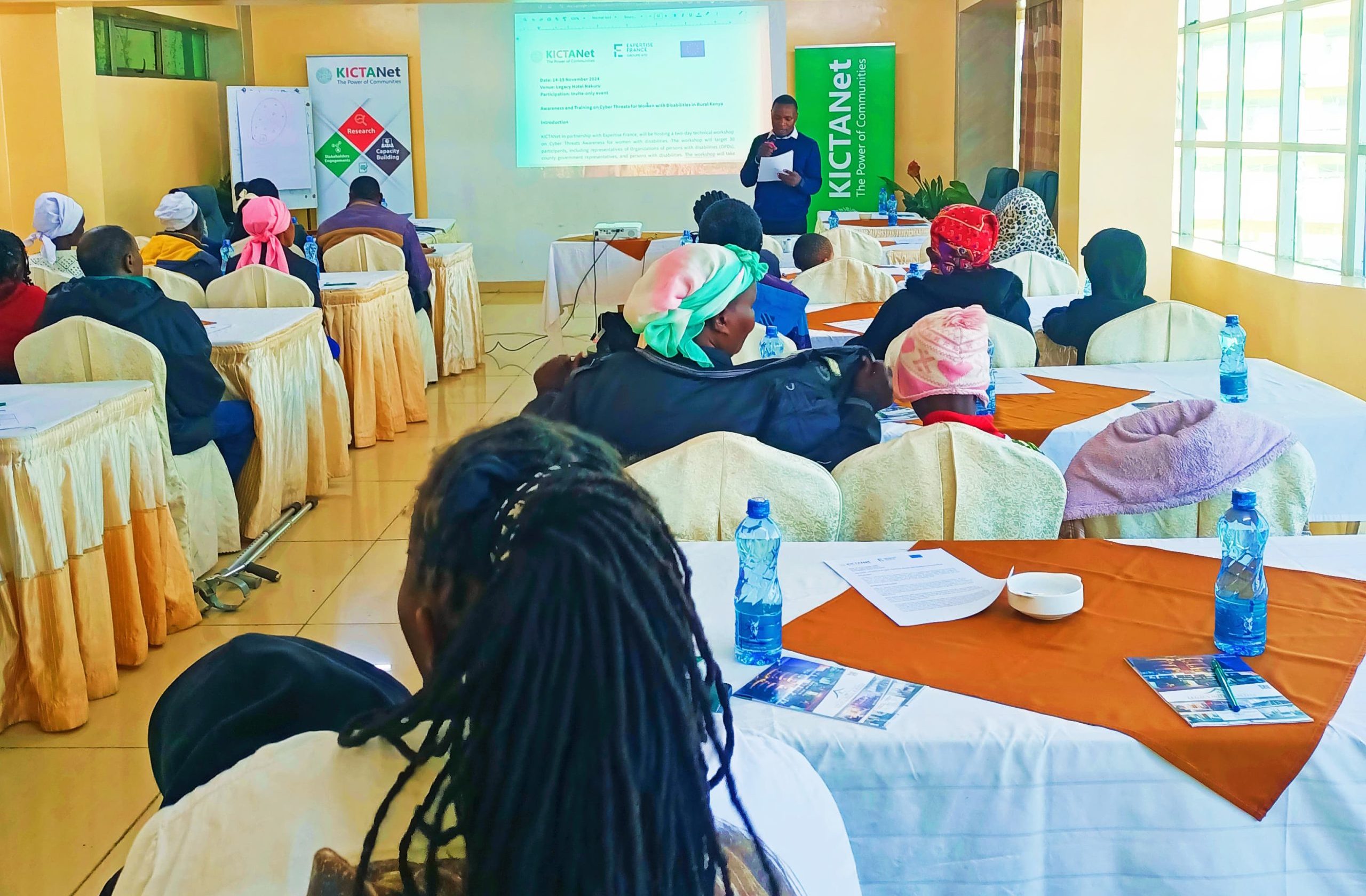According to the Kenya National Bureau of Statistics’ Analytical Report on Disability, only 9.8% of women with disabilities in Kenya have access to the internet, which is a disappointingly low figure. This percentage is even lower in rural areas, where internet penetration is just 13.7%, compared to 42.5% in urban regions.
Notably, and on average, there are more females with disabilities in Kenya (523,883) than their male counterparts (394,330).
These statistics, along with the high prevalence of disability in rural Kenya and the need to enhance digital accessibility advocacy, inspired us—the KICTANet Digital Accessibility for Persons with Disabilities team—to plan and conduct a training workshop on digital safety and cyber hygiene for women with disabilities in rural areas of Nakuru County.
However, when we hit the ground running for the two-day workshop in collaboration with Expertise France, we quickly faced the reality of digital marginalisation. The training did not unfold as originally envisioned; instead, we had to replan and rethink our approaches and methodologies.
The language barrier. It was not possible to conduct the training in English. We had to translate it into a language better understood by the participants, Swahili. I remember, at some points, we had to translate it to Kikuyu, the popular language of residents of Gilgil and Elementaita wards of Nakuru. It is not that we did not anticipate this, but that the participants demanded it so that they could get a better understanding. It was practically impossible to just mention technical terms like “digital accessibility”, cyberstalking”, and “encryption”, among others, without explaining and illustrating them in simple and localized ways.
Several studies have been conducted on digital literacy, gender inequalities etc. Still, nothing would hit you harder than directly interacting and experiencing the language, digital, gender and disability divides first-hand.
Women with disabilities in rural regions face more unique cyber challenges than are described in books and journals. The mention that access to digital devices by persons with disabilities is not a priority is an overstatement. It is far away from a secondary need. This, coupled with the intersection of gender, social stereotypes, poverty and illiteracy, throws off the need for internet connection from their priority needs.
The workshop’s key objectives were to promote a safe and secure digital space for women with disabilities and to minimise their vulnerabilities to online threats. It was encouraging to see participants actively engage in the workshop, sharing thought-provoking ideas and recommendations for addressing the digital divides they face.
One of the main recommendations was for the government to integrate meaningful inclusive digital technologies into its services. The National Council for Persons with Disabilities (NCPWD) needs to employ innovative approaches to reevaluate and update the definition of disability, as the current definition is discriminatory, particularly regarding the term “severe disability,” and it also overlooks other forms of impairments. Vague definitions can lead to lost information and confusion in identifying disabilities. There is also an urgent need for updated and accurate data on disability; without it, sustainable and effective interventions for persons with disabilities cannot be implemented.
Furthermore, disability stakeholders should advocate for inclusive educational systems that can help bridge the literacy divide, which significantly contributes to higher digital illiteracy rates among PWDs, especially women with disabilities.
Additionally, we need to demystify digital disability in society and challenge stereotypes surrounding internet access for women and older generations.
The recommendations mentioned above represent just a few insights from the workshop. However, the broader call is directed towards digital rights advocates, disability champions, and other stakeholders to stand firm on the call to create inclusive, evidence-based, and implementable policies and laws, and most importantly to decentralize digital advocacy and capacity-building efforts to rural areas.
Nicodemus Nyakundi is a Digital Accessibility for PWDs Program Officer at KICTANet. He has a background in IT and advocates for the digital inclusion of persons with disabilities.
![]()




